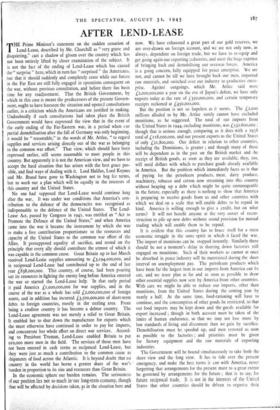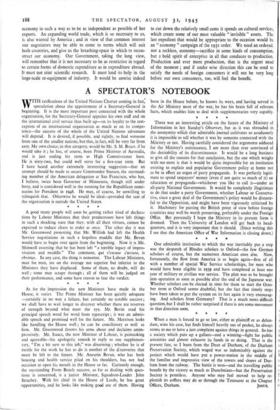AFTER LEND-LEASE
THE Prime Minister's statement on the sudden cessation of Lend-Lease, described by Mr. Churchill as " very grave and disquieting," cast a shadow of gloom over the country which has not been entirely lifted by closer examination of the subject. It is not the fact of the ending of Lend-Lease which has caused the " surprise " here, which in turn has " surprised " the Americans, but that it should suddenly and completely cease while our forces in the Far East are still fully engaged in operations consequent on the war, without previous consultation, and before there has been time for any readjustment. That the British Government, by which in this case is meant the predecessors of the present Govern- ment, ought to have foreseen the situation and opened consultations earlier, is a criticism which the Americans are justified in making. Undoubtedly if such consultations had taken place the British Government would have expressed the view that in the event of the early ending of the Far-Eastern war, in a period when cur partial demobilisation after the fall of Germany was only beginning, it would be " reasonable," in the words of Mr. Attlee, " to regard supplies and services arising directly out of the war as belonging to the common war effort." That view, which should have been expressed earlier, still seems reasonable to most people in this country. But apparently it is not the American view, and we have to accept the hard situation that has arisen with the best grace pos- sible, and find ways of dealing with it. Lord Halifax, Lord Keynes and Mr. Brand have gone to Washington not to beg for terms, but to work out a plan which will be equally in the interests of this country and the United States.
No one had supposed that Lend-Lease would continue long after the warn It was under war conditions that America's con- tribution to the defence of the democracies was recognised as indispensable to the defence of the United States. The Lend- Lease Act, passed by Congress in 1941, was entitled an " Act to Promote the Defence of the United States," and when America came into the war it became the instrument by which she was to make a free contribution proportionate to the resources and capacity of the United States to the common war effort of the Allies. It presupposed equality of sacrifice, and rested on the principle that every ally should contribute the utmost of which it was capable in the common cause. Great Britain up to last March received Lend-Ledse supplies amounting to £3,194,000,000, and in reciprocal Lend-Lease had contributed up to the end of last year £838,000,000. This country, of course, had been pouring out its resources in fighting the enemy long before America entered the war or started the Lend-Lease help. ' In that early period it paid America £z,000,000,000 for war supplies, and in the course of the war as a whole has sold £2,000,000,000 of foreign assets, and in addition has incurred £3,5oo,000,000 of short-term debts to foreign countries, mostly in the sterling area. From being a creditor country it has become a debtor country. The Lend-Lease agreement Was not merely a relief to Great Britain. It enabled her to shut down the manufacture for exports which she must otherwise have continued in order to pay for imports, and concentrate her whole effort on direct war services. Accord- ing to President Truman, Lend-Lease enabled Britain to put 910,000 more men in the field. The services of those men have not been entered in cash terms as reciprocal Lend-Lease, but they were just as- much a contribution to the common cause as shipments of food across the Atlantic. It is beyond doubt that no country in the world has borne a greater share of the war's - burden in proportion to its size and resources than Great Britain.
In the economic sphere our burden remains. The seriousness of our position lies not so much in-our long-term economy, though that will be affected by decisions taken, as in the situation here and now. We have exhausted a great part of our gold reserves, we are over-drawn on foreign account, and we are not only now, as always, dependent on foreign trade, but we have to re-equip and get going again our exporting industries, and meet the huge expense of bringing back and demobilising our overseas forces. America is a going concern, fully equipped for peace enterprise. We are not, and cannot be till we have brought back our men, imported raw materials, and switched over our industry to productive enter- prise. Against outgoings, which Mr. Attlee said were £2,000,000,000 a year on the eve of Japan's defeat, we have only exports today at the rate of £350p00p00, and certain temporary receipts reckoned at £450,000,000.
But the position is not so hopeless as it seems. The £2,000 millions alluded to by Mr. Attlee surely cannot have excluded munitions, as he suggested. The total of our imports from the United States in 1944, excluding munitions, was £532,600,000 ; though that is serious enough, comparing as it does with a 1933 total of £118,000,000, and our present exports to the United States of only £21,800,000. Our deficit in relation to other countries, including the Dominions, is greater ; and though many of these will be dependent as in the past on the British market and the receipt of British goods, as soon as they are available, they, too, will need dollars with which to purchase goods already available in America. But the problem which immediately faces us is that of paying for the petroleum products, meat, dairy produce, machinery, tobacco and cotton now streaming into this country without heaping up a debt which might be quite unmanageable in the future, especially as there is nothing to show that America is preparing to receive goods from us and other countries with which we deal on a scale that will enable debts to be repaid in kind. America is willing enough to give a credit, but on what terms? It will not benefit anyone at the very outset of recon- struction to pile up new debts without sound provision for mutual trading which will enable them to be repaid.
It is evident that this country has to brace itself for a stern economic struggle in the same spirit in which it faced the war. The import of munitions can be stopped instantly. Similarly there should be not a moment's delay in shutting down factories still engaged on munitions. Such of their workers as cannot at once be absorbed in peace industry will be maintained during the short interval on unemployment pay. The petroleum products which have been far the largest item in our imports from America can be cut, and we must plan as far and as soon as possible to draw other essential supplies now sent by America from other countries. With care we might be able to reduce our imports, other than munitions, from the United States during the coming year by nearly a half. At the same time, food-rationing will have to continue, and the consumption of other goods be restricted, so that our food imports may be kept down and the goods available for export increased ; though in both account must be taken of the limits of human endurance, so that we may not lose more by low standards of living and discontent than we gain by sacrifice. Demobilisation must be speeded up, and men restored as soon as possible to the factories ; and priorities must be given for factory equipment and the raw materials of exporting industries.
The Government will be bound simultaneously to take both the short view and the long view. It has to tide over the present emergency, and make the best terms it can with America, never forgetting that arrangements for the present must to a great extent be governed by arrangements for the future ; that is to say, for future reciprocal trade. It is not in the interests of the United States that other countries should be driven to organise their economy in such a way as to be as independent as possible of her exports. An expanding world trade, which is so necessary to us, is also wanted by America ; and in view of that common interest our negotiators may be able to come to terms which will suit both countries, and give us the breathing-space in which to recon- struct our economy. Our Government, taking the long view, will remember that it is not necessary to be as restrictive in regard to certain forms of domestic expenditure as in expenditure abroad. It must not stint scientific research. It must lend its help in the large-scale re-equipment of industry. It would be unwise indeed to cut down the relatively small sums it spends on cultural services. which create some of our most valuable " invisible " assets. The last expedient that would be appropriate to the occasion would be an " economy " campaign of the 1931 order. We need an ordered. not a reckless, economy—sacrifice in some kinds of consumption, but a bold spirit of enterprise in all that conduces to production. Production and ever more production, that is the tfrgent need of the moment ; and if under wise direction this can be used to satisfy the needs of foreign consumers it will not be very long before our own consumers, too, will feel the benefit.



























 Previous page
Previous page